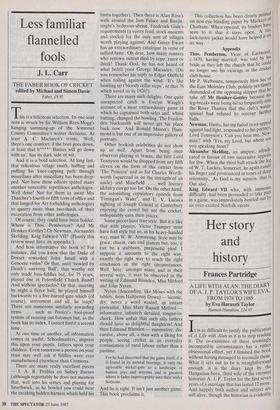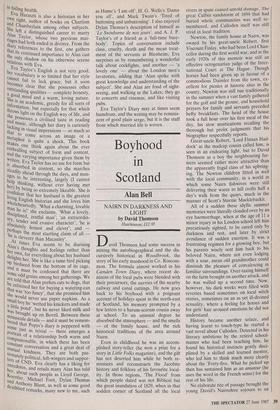Her story and history
Frances Partridge
A LIFE WITH ALAN: THE DIARY OF A. J. P. TAYLOR'S WIFE EVA, FROM 1978 TO 1985 by Eva Haraszti Taylor
Hamish Hamilton, f14.95
It is as difficult to justify the publication of A Life with Alan as it is to stop reading it. The co-existence of these seeminglY incompatible circumstances has a rather obsessional effect, yet I finished the book without having managed to reconcile them. What it sets out to be is straightforward enough: it is the diary kept by the Hungarian-born, third wife of the eminent historian A. J. P. Taylor for the first seven years of a marriage that has lasted 12 more. And happily both author and subject are still alive, though the historian is evidently
in failing health.
Eva Haraszti is also a historian in her own right, author of books on Chartism and Chamberlain among other subjects. She left a distinguished career to marry Alan Taylor, whose two previous mar- riages had both ended in divorce. From the diary references to the first, one gathers that its continued importance to Alan cast the only shadow on his otherwise serene
relations with Eva.
Eva Taylor's English is not very good; her vocabulary is so limited that her style cannot fail to lack grace; but it soon becomes clear that she possesses other outstanding qualities — complete honesty, good mind and a warm, loving nature. She is an academic, greedy for all sorts of information, but especially for that which throws light on the English way of life, and she possesses a civilised taste in reading and music, although her diary is curiously lacking in visual impressions — so much so that to come across an image or a metaphor is quite a shock. This book makes one think again about the ever enthralling subject of form and content, and the varying importance given them by vvriters. Eva Taylor has no use for form but is absorbed in content, so she marches steadily ahead through the days, and man- ages to be interesting, largely (I cannot help thinking, without ever having met her) by being so extremely likeable. She is confident that her husband is the greatest living English historian and she loves him wholeheartedly. 'What a charming, lovable man he is!' she exclaims. 'What a lovely, disciplined, zestful man'; 'an extraordin- ary, tender and evasive character'; 'he is absolutely honest and clever'; and Perhaps the most startling claim of all he is cleverer than Macauley'. At times Eva seems to be diarising Alan's thoughts and feelings rather than her own, for everything about her husband delights her. She is like a tame bird picking P birdseed from the bottom of its cage, and it must be confessed that there are some odd grains among her gatherings. We are told that Alan prefers cats to dogs, that he criticised her for buying a watering-can that was 'too fancy', that she promised him she would never use paper napkins. As a small boy he 'wetted his knickers and made a little pond', but he never liked milk and was brought up on Bovril. Between these Minuscule details — and it must be remem- bered that Pepys's diary is peppered with some just as trivial — there emerges a Portrait of a relationship both warm and companionable, in which there has been constant conversation and a great deal of mutual kindness. They are both pas- sionately political, left-wingers and suppor- ters of CND. Eva clearly has a liking for ahileed°tes, and retails many Alan has told er, about such people as Lloyd George, Koestler, Michael Foot, Dylan Thomas and Anthony Blunt, as well as some good deathbed remarks, many new to me, such as Hume's 'I am off', H. G. Wells's 'Damn you all', and Mark Twain's 'Tired of buttoning and unbuttoning'. I also enjoyed Dylan Thomas's description of himself as `Le Swinburne de nos fours'', and A. J. P. Taylor's of a friend as a `full-time busy- body'. Topics of conversation include class, cruelty, death and the mean treat- ment of the servants at Blenheim; Eva surprises us by remembering a wonderful talk about cockfights, and another — 'a lovely one' — about the London men's lavatories, adding that 'Alan spoke with great knowledge and understanding of the subject'. She and Alan are fond of sight- seeing, and walking in the Lakes; they go to concerts and cinemas, and like visiting pubs.
Eva Taylor's Diary may at times seem humdrum, and the writing may be reminis- cent of good plain serge, but it is the stuff from which married life is woven.










































































 Previous page
Previous page